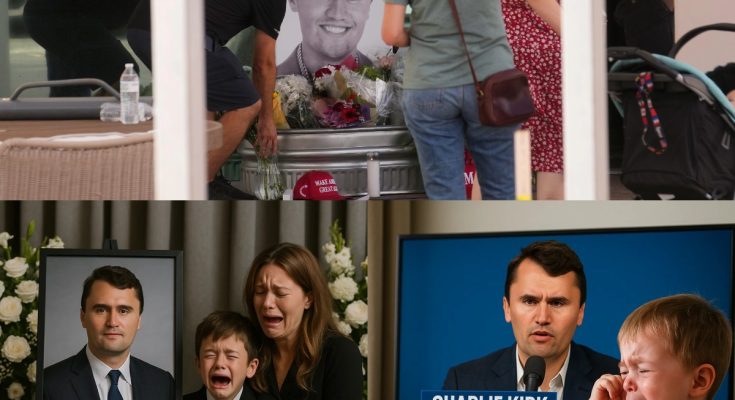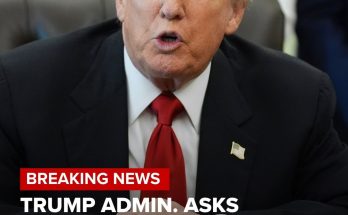WASHINGTON, D.C.—In the cacophonous arena of American political discourse, where rhetoric is often weaponized and screens serve as battlegrounds, a moment of pure, unvarnished humanity cut through the noise this week. It did not originate from a presidential podium or a hallowed congressional hall, but from a living room, witnessed by an audience of two captivated parents. The source was a toddler, his small world momentarily colliding with the vast, impersonal one beaming through the television screen, and his reaction—a simple, desperate cry for his father—briefly silenced the nation’s raging debates.
The father is Charlie Kirk, the fiery founder of the conservative student group Turning Point USA and a ubiquitous voice on the modern right. The child is his young son, whose name the family has chosen to keep private. And the moment, captured not by a news camera but by a mother’s smartphone and later shared by Kirk himself on social media, has become an unexpected Rorschach test for a country yearning for connection amidst division.
The video, now viewed millions of times, is devastating in its simplicity. It begins with the child, we’ll call him “Jack” for the sake of this story, playing on the floor. On the television, a news segment begins, featuring Kirk in his familiar role: gesticulating emphatically, debating a point with a news anchor. The child stops. He looks up. He recognizes the face on the screen, the voice echoing through the room.
He crawls closer to the television, his small hands reaching out to touch the glowing glass. A confused pout forms on his lips. He turns to his mother, questioning, then back to the screen. The realization that the image is not the three-dimensional, hold-me, kiss-me daddy of his everyday life, but a flat, intangible phantom, dawns on him. His face crumples. A single, heart-wrenching sob escapes him, followed by the words that would ignite a global wave of empathy:
“I need my daddy! I need my daddy!”
He then does what any child would do when separated from a parent they love: he tries to find him. The video continues, showing the toddler, tears streaming down his cheeks, waddling out of the living room and down a hallway, calling for his father, checking rooms, believing the man on the TV must be somewhere in the house. It is a primal scene of seeking comfort, a universal language of love and need that transcends politics, ideology, and geography.
Kirk, who was traveling for work at the time, posted the video with the caption, “This wrecked me. This is what it’s all about. Reminder of what truly matters.” The post, expected to resonate with his considerable following, did something far more extraordinary. It went viral, far beyond the confines of conservative circles.
The World Weeps
The response was immediate and overwhelming. Comments and quote-tweets poured in from across the political and cultural spectrum.
“I’m as progressive as they come, and I’m sobbing at my desk,” wrote one user. “This isn’t about left or right. This is about a little boy who loves his dad.”
Another comment read, “I don’t agree with a single thing Charlie Kirk says, but I recognize the love of a child. This is the most human thing I’ve seen all year.”
Parenting blogs, mainstream news outlets, and international media picked up the story. The narrative was no longer about Kirk the political commentator, but about Kirk the father, and more universally, about the sacrifice of parenthood, the pain of separation, and the innocent, unfiltered love that defines a child’s world.
Child development experts were asked to weigh in. Dr. Alanna Gardner, a developmental psychologist at UCLA, explained the phenomenon. “For a toddler, object permanence—the understanding that things continue to exist even when they can’t be seen—is still developing. Seeing a parent on a screen is a profound cognitive dissonance. They are visually present, but emotionally and physically absent. The child’s distress is a natural response to this confusion; it’s a testament to the secure attachment he has with his father. He knows his daddy is a source of comfort, and he’s seeking it out in the only way he knows how.”

A Mirror to Our Own Sacrifices
The reason the moment resonated so deeply, it seems, is that it served as a mirror. In an age of hyper-connectivity, many feel profoundly disconnected. Parents everywhere, regardless of profession, saw their own struggles reflected in that 30-second clip. The working mother on a business trip, the truck driver father away for weeks, the nurse working double shifts—all have felt the pang of missing a bedtime story, a soccer game, a comforting hug.
The video became a symbol of the silent trade-offs of modern life. It highlighted the personal cost behind public personas and, by extension, behind every working parent. It was a reminder that before any of us are politicians, executives, activists, or pundits, we are someone’s child, and many of us are someone’s parent.
Of course, in the fractured landscape of 2024, no moment is entirely immune to politicization. Some critics questioned the authenticity of the video, cynically suggesting it was a staged ploy for sympathy—a charge Kirk’s wife vehemently denied in a follow-up post, stating the video was a private moment sent to her husband to make him smile. Others on the far left struggled to reconcile their disdain for Kirk’s politics with the undeniable humanity of the scene.
Yet, remarkably, these voices were drowned out by the overwhelming tide of empathy. The image of a crying child searching for his father proved to be a more powerful truth than any political argument.
The Aftermath: A Father’s Return
The story has a happy ending. The video concludes with a later clip, taken when Kirk returned home. It shows a beaming, joyful Jack, finally in the arms of his real, tangible daddy, all tears forgotten, his world made whole again. It is the resolution every viewer desperately wanted.
In the days since, Kirk has spoken about the experience on his show. The typically combative host was visibly softened, reflective. “It’s easy to get caught up in the fight,” he told his audience. “You think you’re in a battle of ideas, and you are. But this was a wake-up call. This little boy doesn’t care about any of that. He just cares that I’m his dad. It’s the most important job I’ll ever have.”
Perhaps that is the ultimate power of this story. In a world that constantly asks us to pick a side, to define ourselves by our ideologies, the pure love of a child demands no such thing. It is apolitical. It is unconditional. It reminds us that behind every headline, every tweet, every political argument, there are human beings with families, with loves, and with vulnerabilities.
Little Jack, in his heartbreaking search for his father, didn’t just find him down the hall. In a way, he offered a fleeting path for a weary world to find a sliver of common ground, if only for a moment, in the shared recognition of what truly matters. He reminded a nation how to cry together, before we all went back to learning how to fight.



